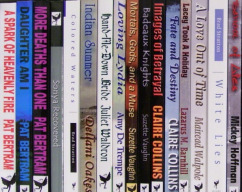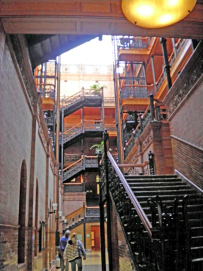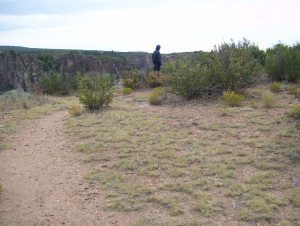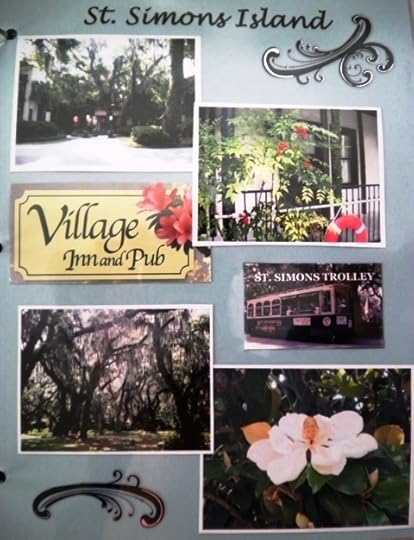Pat Bertram's Blog, page 259
September 11, 2012
Putting a Good Face on Facebook
 Apparently, this is Facebook Week on Bertram’s Blog. This is the fifth in a series of posts I’ve written while trying to make sense of the clamor called Facebook. If you’ve read any of the previous posts (Why Facebook is Not the Great Promotional Tool It Once Was, Feeding the Facebook Beast, Trying to Be Heard Above the Facebook Noise, Unfriending Facebook Un-Friends), you might think I hate Facebook. The truth is, I am fascinated by the site. What I don’t like is how I’ve used it, in the beginning by sending friend requests to strangers and then later by accepting all friend requests indiscriminately and now having to fix the unwieldy mess by unfriending those who don’t engage with me. (I worry about offending people, but truly, if they have 5,000 friends, will they even notice I am gone?)
Apparently, this is Facebook Week on Bertram’s Blog. This is the fifth in a series of posts I’ve written while trying to make sense of the clamor called Facebook. If you’ve read any of the previous posts (Why Facebook is Not the Great Promotional Tool It Once Was, Feeding the Facebook Beast, Trying to Be Heard Above the Facebook Noise, Unfriending Facebook Un-Friends), you might think I hate Facebook. The truth is, I am fascinated by the site. What I don’t like is how I’ve used it, in the beginning by sending friend requests to strangers and then later by accepting all friend requests indiscriminately and now having to fix the unwieldy mess by unfriending those who don’t engage with me. (I worry about offending people, but truly, if they have 5,000 friends, will they even notice I am gone?)
In a perfect world, being connected to what amounts to the entire population of a small town should create book sales, but it doesn’t. Just like with any town, most people you’re connected to don’t know who you are. I once lived in a town with a population of five thousand people, and after living there a couple of years, there were only a few people who even knew my name.
Being connected to so many thousands of people should create a community of people who are truly connected to each other, supporting each other through good times and bad, but it doesn’t. In fact, FB often works to isolate people. If you’ve lost your spouse, for example, seeing a constant stream of anniversary announcements, photos of happy couples, and travel plans for romantic getaways makes you feel even more isolated than you already do.
Being connected to so many people should help dispel loneliness, but it doesn’t. For the most part, facebook is about being upbeat, about bragging of all the good things that come your way, (one person’s “sharing” is another person’s “bragging”), about putting on a good face. (Well, of course. It is Facebook, after all.) But if your life isn’t going great, if you’re experiencing loss or failure, then you feel doubly alone.
Still, Facebook is a microcosm of life (though to be honest it more often resembles the worst of high school). Voltaire wrote, “Each player must accept the cards life deals him or her, but once they are in hand, he or she alone must decide how to play the cards in order to win the game.”
Like life, Facebook deals out a lot of cards everyone rails against, such as adding features we don’t want and taking away features we do. If we stay on the site, we have to accept those “cards,” but it is our choice how to play them. Like life, we reap the effects of bad choices made on Facebook (such as my indiscriminate “friending”). Like life, we have to deal with knowing we have unintentionally hurt some people. (Such as the guy who blocked me because I said something he took to be an insult, when the comment had nothing to do with him and everything to do with my philosophy of writing. See? High school.) Like life, we have to take responsibility for moments of tactlessness, and either repair the damage or take our lumps and move on. No matter how much we want everyone to like us, there will always be those who don’t.
But . . . and this is the key. Our life is our life to do with as we wish within certain parameters, and our Facebook is our Facebook to do with as we wish within the site’s parameters. With life, we have to decide what game we are playing so we know how to play our cards. With Facebook, we also have to decide what we want with the site and play our hand accordingly.
And me — I’m still trying to figure out what the game is, both with life and Facebook.
Tagged: book promotion, does facebook create a sense of community?, does facebook make us lonely?, Facebook, Facebook Week


September 10, 2012
Unfriending Facebook Un-Friends
 I’ve been doing a series of posts on the effectiveness of Facebook as a promotion tool for authors, based on my research and my experiences. Some people have taken these as complaints and negativity, but I’m just trying to make sense of a confusing world.
I’ve been doing a series of posts on the effectiveness of Facebook as a promotion tool for authors, based on my research and my experiences. Some people have taken these as complaints and negativity, but I’m just trying to make sense of a confusing world.
There are four billion users on Facebook, yet most authors seem to be shunted off into a corner of the FB world with other writers. While I’ve gotten to know a lot of great authors this way, I’ve found few readers, which makes sense when you think of it. Authors want something — readers — so we frantically add friends in an effort to reach readers. Readers, on the other hand, don’t frantically friend unknown authors. Most readers stick with previously read authors, or find books by word of mouth, blog reviews and book websites, local bookstores, online stores, the library. (This information is from an informal poll I once did: How Do You Choose the Books You Want to Read?)
When I first joined Facebook, I was guilty of adding as many friends as I could since I thought that was the purpose of social networking. In fact, I almost reached the cut-off point of 5,000 friends. (I’m sure you’ve noticed that some people have more than 5,000 friends. That’s probably because of inactive accounts. I go through my friend list periodically and delete inactive accounts. The only serve to swell numbers and make FB even more unwieldy than it already is.)
When I realized that social networking is about being social, I stopped sending friend requests, and started trying to get to know the people I am connected to. In the process, I am gradually culling my friend list. If someone has four or five thousand friends and has never once bothered to respond to anything I have done on Facebook, I unfriend them. If someone whose friend request I have accepted (I have not sent a friend request to a stranger in over three years, so I know that any friends made in those years are at their behest) spams me or ignores me, I unfriend them. If they are multi-level marketers or any other such blatant scammers, I unfriend them.
This sounds harsh, doesn’t it? But if Facebook hasn’t created a mass of readers for me, then it’s mostly for fun, and if it’s mostly for fun, there is no point in being connected to people who do not enrich my life. (I hope you don’t think I am unfriending everyone. I still have almost 2,000 friends, a good percentage of whom I actually talk to.)
Of course, some people think unfriending is silly, because what difference does it make how many friends you have, especially since you see so few of them anyway, but it does make a difference. When I had close to 5,000 friends, every time I tried to individually invite friends to an event, it crashed my computer. (Except for the Suspense/Thriller Writers Self-Promotion Extravaganzas on Saturday, I don’t bother to do events any more. Where hundreds of people used to respond, now only a handful do.)
Also, too many friends clogs the news feed with posts I have no interest in. It is possible to hide those posters from my newsfeed, but if I have no interest in people’s posts, why am I connected to these un-friends? Why not just unfriend them? So I do.
People do the same to me. One woman told me she unfriended me because I never participated in any of her events. It was a valid observation. At the time, I had 4,000 friends, and couldn’t keep track of them all. All I did on Facebook at the time was keep my writing discussion going, so the people I was most interested in were the people who participated in my discussions. (I hate to admit it, but I still don’t participate in other people’s events; there are simply too many. And anyway, I still prefer to spend most of my time with my discussion group. It’s a small space of sanity in the choatic FB world.)
Perhaps none of this matters. Perhaps unfriending is just a game or a phase I am going through. But the truth is . . . hmmm. I don’t know what the truth is. Maybe I don’t like being ignored. Or maybe I have had a surfeit of inanity and negativity. (What many people consider as positive thinking, I often see as inane, and inanity feels to me like negativity.) Or maybe I’m fighting a system I have no way of beating. Or maybe I’m getting curmudgeonly. Or maybe I’m trying to do FB over, and do it right this time. Or maybe, just maybe, I’m positioning myself for success, making room for the thousands of new friends I am going to make through my writing.
Tagged: book promotion, Facebook, Suspense/Thriller Writers Group on Facebook, unfriending


September 9, 2012
Trying to Be Heard Above the Facebook Noise
 I’m sure it seems as if I’m obsessed with Facebook, considering all the posts I’ve been writing about the site lately, but the truth is, it confuses me. What’s the point of having thousands of friends if only a few of those “friends” show up in our news feeds, and our posts show up in only a few of theirs? Why do we have to post silly sayings and quotes by other people to attract attention to our own writing? Why are we supposed to upload colorful images and share cute pet photos? What does any of that have to do with our books? Shouldn’t the books be enough to attract attention?
I’m sure it seems as if I’m obsessed with Facebook, considering all the posts I’ve been writing about the site lately, but the truth is, it confuses me. What’s the point of having thousands of friends if only a few of those “friends” show up in our news feeds, and our posts show up in only a few of theirs? Why do we have to post silly sayings and quotes by other people to attract attention to our own writing? Why are we supposed to upload colorful images and share cute pet photos? What does any of that have to do with our books? Shouldn’t the books be enough to attract attention?
I do know the answer to that last question. If you are James Patterson, mention of a book is news, but if you are Pat Bertram, it’s blatant self-promo.
There is so much noise on Facebook, with everyone screaming “Looka me, looka me,” like kids on a playground, that it’s almost impossible to hear the quiet writers who just want people to check out their books.
I thought if I posted intelligent questions, I’d attract intelligent friends, and the ones I interact with are exceedingly intelligent. The trouble is, they are in the same position I am in — looking for quiet readers in a noisy world.
I’m a writer, right? I should be able to think of witty things to say that will make people want to get to know me and my books, but my wit deserts me when it’s most needed. When I do think of something witty, it’s at three o’clock in the morning. I’m not about to wake fully, turn on the light, write down my witticism, and then lie there for hours, waiting in vain for sleep to return. (My wit centers more on puns, anyway, such as: Waiting in vein. Is that what vampires do? Well, maybe “wit” is a bit of an exaggeration.) So what passes for wit, passes with the night, and in the morning I don’t remember. (Probably just as well if “waiting in vein” is the best I can do.)
One of my favorite people on Facebook, who manages to be intelligent and witty and post cute pet photos, is Malcolm R. Campbell. (He also happens to be a darn good writer.) Malcolm once said that he’s written more to promote his books than he did to write them. (See? I told you he was witty. Or at least truthful.)
It’s kind of pathetic when you think about it — you rip out your heart and throw it into your book, and then you have to take what’s left of you and spent it on sites like Facebook. Is it worth it? I’m not sure. For a long time, I thought it was. I was having fun, and there was always the hope of hitting some sort of friending jackpot. But now? It seems like . . . noise. Something to block out.
Still, wit aside, I do have a modicum of intelligence, a bit of computer savvy, a tinge of knowledge about the workings of the human psyche, so I should be able to make my voice heard above the noise, right? But in the back of my mind is the small question, what then? My books aren’t the next erotic vampire bondage serial killer novelty, so will my being heard make any difference?
Tagged: book promotion, Facebook, finding fame and fortune on facebook, promotion


September 8, 2012
Feeding the Facebook Beast
 Yesterday, I talked about how Facebook is not the great promotional tool we authors had been led to believe, and yet some people do exceedingly well on the site. The truth is, Facebook is a beast that feeds on content. It needs a never-ending source of funny, inspiring, informative, controversial, topical, and brief posts that engage users and keeps them liking, sharing, and commenting. The more a post is shared, liked, and commented on, the more visible the post becomes. (Facebook uses something called EdgeRank to keep track of all this, which seems similar to Amazon’s algorithms. Amazon, like Facebook, rewards those who are doing well with additional visibility. In the same way, rich celebrities who already have everything they need, get free perks just because they are rich celebrities.)
Yesterday, I talked about how Facebook is not the great promotional tool we authors had been led to believe, and yet some people do exceedingly well on the site. The truth is, Facebook is a beast that feeds on content. It needs a never-ending source of funny, inspiring, informative, controversial, topical, and brief posts that engage users and keeps them liking, sharing, and commenting. The more a post is shared, liked, and commented on, the more visible the post becomes. (Facebook uses something called EdgeRank to keep track of all this, which seems similar to Amazon’s algorithms. Amazon, like Facebook, rewards those who are doing well with additional visibility. In the same way, rich celebrities who already have everything they need, get free perks just because they are rich celebrities.)
When someone interacts in any way with a post on a fan page, for example, it shows up the feed of their friends, but the originator of the content gets the credit. And so the content provider gets more reach, and because they get more reach, Facebook will ensure that this continues by letting more and more fans see the posts, which increases the page reach of the content provider. Because, of course, without content, FB will starve since its users will go where they can find funny inspiring, informative, controversial, topical, and brief posts — places such as Twitter, Tumblr, Pinterest, or whatever the next big thing will be.
If you don’t have such engaging posts, then even if you have 1500 fans, only about 1% will ever see what you post. If you want to know what attracts attention, look no further than your own feed. What do you see that has been shared a hundred times, a thousand times? What have you laughed at, commented on, shared? Photos with funny, inspiring, informative, controversial, topical, and brief commentary, that’s what. (Well, you do unless you’re a curmudgeon like me, and then such content simply annoys you. If I see one more animal with baby-talk captions, acting like a human, I will probably scream so loud, it will reverberate through the center of the earth and cause earthquakes on the other side of the world.)
All this research the past couple of days into the workings of Facebook has given me a few ideas of what to do with my fan page — contests, questions, quotes from my books, even . . gasp . . . photos with captions.
Tagged: Amazon's alogrithms, EdgeRank, Facebook, fan page, increasing reach on Facebook, promoting on facebook


September 7, 2012
Why Facebook is Not the Great Promotional Tool It Once Was
Ar e you one of those authors who joined Facebook, hoping to find fame and fortune, and have only found . . . Facebook?
e you one of those authors who joined Facebook, hoping to find fame and fortune, and have only found . . . Facebook?
After my books were accepted for publication, and while I waited for them to become available, I spent a lot of time researching how to promote online. The first unanimous suggestion was to get a website, the second was to maintain a blog, and the third, of course, was to create a presence on social networking sites. I’d already done the first two, so that left the third option. How hard could networking be? Add the maximum number of friends, post status updates and blog links, create discussion groups as a way to get to know other authors. Sounded like fun.
At first, it worked the way it was supposed to — I made a lot of friends, had some great discussions, promoted my online release party via Facebook and MySpace. I even sold some books.
And then . . . nothing. Sure, I still had friends, but sales dropped off, and when my next release party came around, almost no one stopped by. (By then, MySpace was practically defunct — everyone I met on MySpace had migrated to Facebook.)
Many authors have had the same experience as I did. So what happened? Why, after all those articles about how great Facebook was for promotion, didn’t we get the results we hoped for? Because of the ever-changing face of Facebook, that’s why.
When I joined Facebook, it was at the tag end of the free-for-all, where anyone could post anything and all of your “friends” would see it. Events and requests to “like” a page weren’t hidden in your notifications as they are now, but were almost impossible to miss. You pretty much had to respond one way or another. Groups were much more effective than they are now. Group administrators could send a message to everyone in the group, and there were group discussions boards (which is what I used the group messaging for — to announce the weekly discussion).
One by one, all the functional parts of Facebook (those that worked best for promotion, that is) have disappeared, to be replaced by . . . not much of anything, actually. If you post something on your fan page, it shows up in the news feed of only a small percentage of people. They say 10%, but it’s more like 2%. My current reach — the maximum number of people per week who could have seen my posts — is 285. Considering that I post something every day, that means FB shows each post to only about 40 people a day, which is a very small fraction of my 1487 “likes.” If I want more people to see my posts, I can pay to get more views. Bizarre, isn’t it?
I don’t know the statistics for profile views since they aren’t posted on the site, but going by my own feed, not many people at all see anything — just the same few people every day. And now that anyone has the ability to shut off the posts of anyone they want, you could be seeing their posts, and they won’t see anything of yours.
Apparently, Facebook read the same books and articles we did about how to promote on the site, and they are doing everything they can to prevent our promotion efforts from being very effective. (They want to be the only ones making money.)
The first self-published millionaire who subsequently wrote the book about how to make a million via FB, cheated by maxing out multiple accounts — you can only have 5000 friends, so he had more than one account going at the same time. But that should come as no surprise now that he has been outed as having purchased scads of reviews.
So, if you are not getting the results you hoped for by promoting your books on Facebook, don’t be too hard on yourself. It’s not your fault at all. It’s the fault of all those who came first and scammed the system before you had a chance.
Tagged: book promotion, Facebook, finding fame and fortune on facebook, promotion, scamming facebook


September 6, 2012
A Dream Come True For Bibliophiles
 My publisher, Second Wind Publishing, is going to be at the Bookmarks Festival of Books in Winston-Salem on Saturday, Sept. 8, 2012 and I’ve been trying to get information about the festival to write a promo for the Second Wind blog. It’s hard. I don’t want to mention all the big names that will be there because . . . well, because it’s a Second Wind company blog, and it just doesn’t seem right to promote non-Second Wind authors, especially when they don’t need the promo. A lot of new Second Wind authors will be there signing books, but since they are so new I don’t know yet who they are, and since I’ve never attended the festival, it’s difficult to write an exciting article.
My publisher, Second Wind Publishing, is going to be at the Bookmarks Festival of Books in Winston-Salem on Saturday, Sept. 8, 2012 and I’ve been trying to get information about the festival to write a promo for the Second Wind blog. It’s hard. I don’t want to mention all the big names that will be there because . . . well, because it’s a Second Wind company blog, and it just doesn’t seem right to promote non-Second Wind authors, especially when they don’t need the promo. A lot of new Second Wind authors will be there signing books, but since they are so new I don’t know yet who they are, and since I’ve never attended the festival, it’s difficult to write an exciting article.
I must have been more focused on the article than I realized, because last night I dreamt I was at the festival. (Well, a festival anyway. Mine was a nightmare, and I’m sure the real Bookmarks Festival is a dream come true for bibliophiles.) I set up my computer at a side table, and left it there while I busied myself with other tasks, and whenever I turned around, someone was using my computer. The last time I turned around, the computer was gone. Someone had taken mine and left a piece of junk in its place. Of course, since this was a frustration dream, I dashed around, looking for the computer, getting more and more lost nd frustrated by the minute. Every time I found someone to tell of the theft, they’d make scathing comments about leaving something so valuable unattended. My response, “But it’s never happened before,” sure didn’t win me any friends.
I woke up thinking that the sleeping me sure was stupid. I would never in a million years leave my computer unattended in a crowd. I would never even set it up in a crowd. It’s too valuable to me, being an eye into the electronic world where I have friends and even a smattering of respect.
But all’s well that ends well. Despite the frustration of the dream, I awoke rested, I did not get my computer stolen, and the Bookmarks Festival will carry on without me.
Even though I will not be at the festival, my books will be. So, if you are going to be in Winston Salem this Saturday, be sure to check out the Bookmarks Festival of Books. It’s from 10 a.m.-5 p.m. in the Downtown Arts District in Winston-Salem, centering on Trade and Sixth Streets. And don’t forget to stop at the Second Wind Publishing booth and check out my books. Even better, buy one!
(In case you don’t know what books I’ve written, check out the right sidebar of this blog. They are all listed.)
Tagged: Bookmarks Festival of Books, frustration dream, Second Wind Publishing, Winston Salem book festival


September 5, 2012
An Incidental Tourist
I’ve watched thousands of movies over the years, but I’ve never considered myself a fan so much as a student. I don’t gush over movie stars, though I have paid attention to how they act, the way they deliver their lines, and the characters they play. I’ve never felt any desire to see places where movies were filmed, such as the field from The Field of Dreams. (In truth, I don’t understand the attraction. The field in Iowa is not a magical field as it was portrayed in the movie. It is simply a prosaic place where the magic of filmmaking once happened.)
Still, quite incidentally during my travels the past couple of years, I’ve seen several places made famous by movies: Monument Valley, Ridgeway (where much of True Grit was filmed), the LaBrea tarpits, Bagdad Cafe, the house where Sam Baldwin lived in Sleepless in Seattle, and the Bradbury Building. I’m sure I’ve passed by dozens of other film-famous settings without being aware of their significance, so it’s amazing to me that I recognized as many places as I did.
One of the hardest things about having lost to death the person connecting me to life is that when I see such places, I can’t tell him what I have seen. He was the one I watched all those movies with, and he would have appreciated seeing those settings way more than I did. The irony is that when he was alive, we couldn’t travel due to his health, so it’s only his death that has brought the world to me (or do I mean me to the world?).
 One movie he enjoyed was Wolf, and he was especially taken with the office building where Will Randall worked. On a recent excursion to downtown LA, I stopped in to see the Bradbury Building, which had been described as an architectural marvel, and there it was — the office building from Wolf.
One movie he enjoyed was Wolf, and he was especially taken with the office building where Will Randall worked. On a recent excursion to downtown LA, I stopped in to see the Bradbury Building, which had been described as an architectural marvel, and there it was — the office building from Wolf.
I thought I’ve been keeping a scrapbook of my excursions to prove to myself that I am real, but the other day it struck me that I’m really keeping it for him — my deceased mate. I can’t tell him in person what I’ve been doing (as I always did), so the photos are a way of sharing my experiences in abstentia. He would have loved seeing the Bradbury Building — it’s even more incredible than in the movie — light-filled, soaring ceilings, ornate iron grillwork, marble stairs, and cage elevators — so I marveled in his stead.
(If you don’t know the name of the building, I’m sure you still recognize it. The place has been featured in many television series, music videos, and movies, most notably, Blade Runner, Chinatown, Murphy’s Law, Lethal Weapon 4, and of course, Wolf.)
Tagged: movies, The Bradbury Building, The Field of Dreams, the office building in Wolf, watching movies

September 4, 2012
A Photo is Not a Living Person (Though Sometimes I Wish it Were)
 I only have two photos of my deceased life mate/soul mate. It seems odd in this age of electronic imagery to have so few pictures, but there was no reason to take photos. We were almost always together. We remembered the things we did, the events we participated in, the conversations we had. A camera would have only been an intrusion in our lives.
I only have two photos of my deceased life mate/soul mate. It seems odd in this age of electronic imagery to have so few pictures, but there was no reason to take photos. We were almost always together. We remembered the things we did, the events we participated in, the conversations we had. A camera would have only been an intrusion in our lives.
One of the photos I have is fifteen years old, a formal photo of the two of us, taken at my parents’ 50th wedding anniversary celebration. After he died, his mother wanted a picture, so I took a photo of the picture, cropped me out, and sent it to her. That image of him sat in my computer for over a year without my looking at it. I simply could not bear the pictorial reminder that he was forever gone from this earth. (To be honest, I still cannot bear the thought of his being gone.) Even worse, it didn’t look like him, not the way he looked toward the end (though it had been a perfect likeness at one time), so I barely recognized him. I didn’t want to supplant what images I had of him in my mind with a photo.
About a year ago, however, my memories of him started to fade, and I desperately needed to see him, so I printed out the photo. Somehow, the photo makes him look happy and radiant, as if he were smiling at something only he knew. (Which is odd, because he does not look at all like that in the original photo.)
The other photo of him is from a few months before we died. (I can’t believe I made such a typo, but I’m leaving it in because in so many ways, “we” did die.) I’d just come back from a trip in a rental car, and since a rental car is a terrible thing to waste, we took a rutted and sparsely graveled road to the north rim of the Black Canyon of the Gunnison. (Although we lived only twenty miles from there, neither of our old cars could safely make the trip.) I didn’t realize I had a photo of him until months after his death when I went through the pictures I took of the canyon. (By then, I often took photos — seeing life through the lens of a camera was the only way I could deal with his dying and then with his death.) He is standing at the rim of the Black Canyon, his back to me, staring out at . . . eternity? I was able to look at this photo occasionally, for some reason — maybe because I was able to “see” him the way I remembered him.
There is a third photo, one his oncologist took. I’d considered asking for it, but I remember how appalled my mate was when he saw it — he looked old and haggard and gray and very, very ill. I didn’t want to remember him as such, so I never followed through with my inclination.
A few months ago, I put away the photos. I went from not wanting to look at the pictures, to drawing comfort from them, to not wanting the constant reminder he was dead. But yesterday, I set the photos out again. I needed the feeling of connection, no matter how ephemeral. I don’t know how long it will be before I can’t stand to look at them again — perhaps only a day or two. As much as I need to feel connected to him (sometimes that lack of connection is like an itch deep inside), the truth is, a photo is not a living person, and I cannot feel connected to an image on a piece of paper.
Tagged: Black Canyon of the Gunnison, grief and photos, life through the lens of a camera, photos of the deceased


September 3, 2012
How Will the Unfulfilled Dreams of Today’s Youth Create the World of Tomorrow?
 Progress is fueled by the dreams of the young, especially dreams that did not come true. Children born into loveless riches will sometimes go to extraordinary lengths to find the love they crave. Children born into poverty will often accomplish impossible tasks in order to have the security or possessions they desperately want. (Me . . . I only wanted to be left alone so I could read. Not exactly a great motivator to become hugely successful.)
Progress is fueled by the dreams of the young, especially dreams that did not come true. Children born into loveless riches will sometimes go to extraordinary lengths to find the love they crave. Children born into poverty will often accomplish impossible tasks in order to have the security or possessions they desperately want. (Me . . . I only wanted to be left alone so I could read. Not exactly a great motivator to become hugely successful.)
I am connected to thousands of people all over the internet who had unfulfilled youthful dreams of being published writers. The sheer mass of people past their first youth (and second and third) who are now pursuing that dream could be the juggernaut that crashed through the boundaries established by the corporate publishers, bypassed the gatekeepers (agents), and helped create a whole new industry to service self-publishers. (If there is a need, there will always be someone out there willing to make a buck fulfilling that need.)
The present generations growing up won’t have those unfulfilled dreams of being published authors because they can sit down right now, write what they want, and publish it. They don’t have to strive for the dream of publishing — they can get it immediately. So how is that going to affect the future of publishing? It’s possible that the human need for storytelling will continue to fuel the book industry. It’s possible the unfulfilled dreams of the young will center more on making a fortune from writing, and so in later years, they will go chasing after corporate publishers. (Despite the myth of being able to make a fortune self-publishing, only a very small percentage of writers ever achieve that goal, and often the fortune comes when the self-publishers end up signing a contract with the corporate publishers.) It’s also possible the world will be completely different when the present generation of nineteen year olds reaches that age when their children are grown and they can indulge their dreams.
I don’t have a clue what this generation is like. Well — I have a smattering of a clue. In a recent article, You’ve lost that lovin’ feelin’?, Paul Eisentein mentions that nearly a third of American 19-year-olds haven’t bothered to get their driver’s licenses yet. Some have no interest in cars, some can’t afford the payments, some have desire to deal with the outside world since they can find all the companionship they want via their various electronic appendages such as cellphones and Ipads. Whatever the reason for abandoning this automotive rite of passage, there is a huge difference between this generation and previous ones. They are just starting their journey, and the world will change to meet their needs. With as rapidly as things change, the gadgets that will run our lives twenty years from now have not yet even been imagined.
If you’re expecting me to provide a response to question in the title, “How Will the Unfulfilled Dreams of Today’s Youth Create the World of Tomorrow?” you’re out of luck. I don’t have an answer. I was hoping you did.
Tagged: dreams of being publised, dreams of the young, progress, striving for dreams, today's youth, unfulfilled dreams


September 2, 2012
No Life in My Life
I am heading toward the two-and-a-half-year anniversary of the death of my life mate/soul mate/best friend. The breath-stealing pain that I endured for many months has dissipated, so much so that I have a hard time believing I ever went through such agony. The all-encompassing loneliness that followed the pain has also dissipated, and I am comfortable with the idea of growing old alone (or if not comfortable, at least tolerant of the possibility).
I’ve even gotten over the horrendous feeling of always waiting. Not waiting for something. Simply waiting. Nothing has changed, of course, except my attitude. I am training myself to be in the present, to be me, to believe that nothing is important but what is right here, right now. It’s working — I am more at peace than I have been in a long time.
But . . . there is no life in my life, no spring in my step, no spark in my spirit.
I’m not a sentimental person. I seldom kept keepsakes and I never chronicled my life with photos, but now I do both to prove to myself that yes, I am alive, and yes, I am doing something with my years. It feels as if I have done nothing but stagnate the past two years, and yet I have that scrapbook of paper memories showing me the truth:
Since October of 2010, when I started keeping the scrapbook, I have spent time on both USA coasts, hiked in the desert and on sandy beaches, climbed lighthouses and rocky knolls, ridden an amphibious vehicle and the world’s largest traveling Ferris wheel, fed ducks and sea gulls, walked along rivers and around lakes, visited ghost towns and overgrown cities, trekked the length of four piers on four different beaches, gone to art exhibits and historical museums, attended fairs and festivals, learned to shoot guns and amazing photographs. I’ve traveled alone and with friends on planes, trains, and automobiles. And I have tasted hundreds of different foods, some delicious, some that can barely be considered edible.
So why do I feel as if there is no life in my life? Do I need to be in love to sparkle with vitality? I hope not. I hate the thought that my well-being rests in someone else’s hands. The truth is probably more prosaic — although I am not actively mourning, I am still grieving, still disconnected from the world. After the death of the one person who connects you to the world, it takes years to find a different way of connecting. All of these experiences I have mentioned are ways to keep me busy while the real work of reconnecting to the world is going on deep inside.
Besides, the experiences were good ones.
Tagged: disconnected from the world, feeling of being in limbo, I am alive, loneliness and grief, losing a sense of my reality, loss, scrapbook







